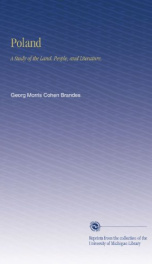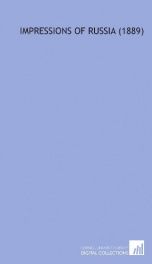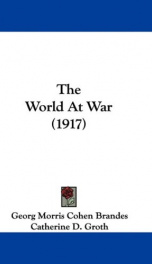Brandes Georg Morris Cohen

Georg Morris Cohen Brandes (4 February 1842 – 19 February 1927) was a Danish critic and scholar who had great influence on Scandinavian and European literature from the 1870s through the turn of the 20th century. He is seen as the theorist behind the "Modern Break-through" of Scandinavian culture. At the age of 30, Brandes formulated the principles of a new realism and naturalism, condemning hyper-aesthetic writing and fantasy in literature. According to Brandes, literature should be an organ "of the great thoughts of liberty and the progress of humanity." His literary goals were shared by many authors , among them the Norwegian realist playwright Henrik Ibsen. When Georg Brandes held a series of lectures in 1871 with the title "Main Currents in 19th-century Literature," he defined the Modern Break-through and started the movement that would become Cultural Radicalism. In 1884 Viggo Hørup, Georg Brandes, and his brother Edvard Brandes started the daily newspaper Politiken with the motto: "The paper of greater enlightenment." The paper and their political debates led to a split of the liberal party Venstre in 1905 and created the new party Det Radikale Venstre. He was born in Copenhagen in a non-orthodox Jewish middle-class family and became a student at the University of Copenhagen in 1859 where he first studied jurisprudence. From this, however, his interests soon turned to philosophy and aesthetics. In 1862 he won the gold medal of the university for an essay on The Idea of Nemesis among the Ancients. Before this, indeed since 1858, he had shown a remarkable gift for verse-writing, the results of which, however, were not abundant enough to justify separate publication. Brandes did not collect his poems until as late as 1898. At the university, which he left in 1864, Brandes was influenced by the writings of Heiberg in criticism and Søren Kierkegaard in philosophy, influences which continued to leave traces on his work. In 1866, he took part in the controversy raised by the works of Rasmus Nielsen in a treatise on "Dualism in our Recent Philosophy." From 1865 to 1871 he traveled much in Europe, acquainting himself with the condition of literature in the principal centers of learning. His first important contribution to letters was his Aesthetic Studies (1868), where his maturer method is already foreshadowed in several brief monographs on Danish poets. In 1870 he published several important volumes, The French Aesthetics of the Present Day, dealing chiefly with Hippolyte Taine, Criticisms and Portraits, and a translation of The Subjection of Women by John Stuart Mill, whom he had met that year during a visit to England. Brandes now took his place as the leading northern European critic, applying to local conditions and habits of thought the methods of Taine. He became docent or reader in Belles Lettres at the University of Copenhagen, where his lectures were the sensation for the time. His famous opening lecture, on 3 November 1871, is often considered the gateway of modern Danish literature. On the professorship of Aesthetics becoming vacant in 1872, it was taken as a matter of course that Brandes would be appointed. But the young critic had offended many sensibilities by his ardent advocacy of modern ideas; he was known to be a Jew, his convictions were Radical, he was suspected of being an atheist. The authorities refused to elect him, but his fitness for the post was so obvious that the chair of Aesthetics remained vacant, no one else daring to place himself in comparison with Brandes. In the midst of these polemics the critic began to issue the most ambitious of his works, Main Currents in the Literature of the Nineteenth Century, of which four volumes appeared between 1872 and 1875 (English translation, 1901-1905). The brilliant novelty of this criticism of the literature of major European countries at the beginning of the 19th century, and his description of the general revolt against the pseudo-classicism of the 18th century, at once attracted attention outside Denmark. The tumult which gathered round the person of the critic increased the success of the work, and the reputation of Brandes grew apace, especially in Germany and Russia. Among his later writings must be mentioned the monographs on Søren Kierkegaard (1877), on Esaias Tegnér (1878), on Benjamin Disraeli (1878), Ferdinand Lassalle (in German, 1877), Ludvig Holberg (1884), on Henrik Ibsen (1899) and on Anatole France (1905). Brandes wrote with great depth on the main contemporary poets and novelists of his own country and of Norway, and he and his disciples were for a long time the arbiters of literary fame in the north. His Danish Poets (1877), containing studies of Carsten Hauch, Ludvig Bødtcher, Christian Winther, and Paludan-Müller, his Men of the Modern Transition (1883), and his Essays (1889), are volumes essential to the proper study of modern Scandinavian literature. He wrote an excellent book on Poland (1888; English translation, 1903), and was one of the editors of the German version of Ibsen. In 1877 Brandes left Copenhagen and settled in Berlin, taking a considerable part in the aesthetic life of that city. His political views, however, made Prussia uncomfortable for him, and he returned in 1883 to Copenhagen, where he found a whole new school of writers and thinkers eager to receive him as their leader. The most important of his recent works has been his study of Shakespeare (1897-1898), which was translated into English by William Archer, and was highly acclaimed. It was, perhaps, the most authoritative work on Shakespeare, not principally intended for an English-speaking audience, which had been published in any country. He was afterwards engaged on a history of modern Scandinavian literature. In his critical work, which extended over a wider field than that of any other living writer, Brandes was aided by a singularly charming style, lucid and reasonable, enthusiastic without extravagance, brilliant and colored without affectation. His influence on the Scandinavian writers of the 1880s was very great , but a reaction, headed by Holger Drachmann, against his "realistic" doctrines, began in 1885. In 1900 he collected his works for the first time in a complete and popular edition, and began to work on a German edition, completed in 1902. Between the years of 1886 and 1888 Brandes was engaged in a relationship with the Swedish authoress Victoria Benedictsson (who was known under the male pseudonym Ernst Ahlgren and who wrote "Penningar" and Fru "Marianne"). Victoria Benedictsson sliced her throat, due to her unhappy love affair and a demeaning recencion by Brandes' brother, in a hotel room in Denmark. After 1890, Brandes partly turned away from the direct fight, concentrating around "great personalities" who enlightened the life of their mediocre contemporaries. In this period, he discovered Friedrich Nietzsche whom he introduced to Scandinavian culture. Brandes, in an 1888 letter, wrote to Nietzsche asking him to read the works of Kierkegaard. He described Nietzsche's philosophy as "aristocratic radicalism", a description which delighted Nietzsche, and the idea of "aristocratic radicalism" influenced most of the later works of Brandes and resulted in voluminous biographies Wolfgang Goethe (1914-15), Francois de Voltaire (1916-17), Gaius Julius Cæsar 1918 and Michelangelo (1921). The influence of Brandes faded somewhat after 1900 but he was still considered a leading figure of Danish literary life and his international reputation was growing. In many ways he became a modern Scandinavian Voltaire with a great moral authority, condemning the maltreatment of national minorities, the persecution of Dreyfus etc. During World War I he condemned the national aggression and imperialism on both sides and his last years were dedicated to anti-religious polemic. In this late period he made new connections to intellectuals like Henri Barbusse, Romain Rolland and E. D. Morel. Today, Brandes still stands as one of the most influential inspirations of Danish literature , an equal of Holberg and Grundtvig. This has not prevented him from being criticized. The right wing has condemned him as an unpatriotic and subversive blasphemer and fornicator. Left wing socialists have criticized his elitist attitudes, while the feminist movement has often regarded his positive attitude of sexual equality as being inconsequential. Nonetheless his influence in Danish cultural history is still far-ranging. His brother Edvard Brandes (1847-1931), also a well-known critic, was the author of a number of plays, and of two psychological novels: A Politician (1889), and Young Blood (1899). He became an outstanding political figure of the party Det Radikale Venstre.
do you like this author?
What readers are saying
What do you think? Write your own comment on this book!
write a commentWhat readers are saying
What do you think? Write your own comment on this author!
write a commentBook list

reminiscences of my childhood and youth
Series:
Unknown
Year:
Unknown
Raiting:
4/5
Purchase of this book includes free trial access to www.million-books.com where you can read more than a million books for free. This is an OCR edition with typos. Excerpt from book: TRANSITIONAL YEARS Schoolboy FanciesReligionEarly FriendsDaemonic TheoryA West Indian FriendMy Acquaintance WidensPoliticsThe Reactionary PartyThe David FamilyA Student SocietyAn Excursion to Sleivig TemperamentThe LawHegelSpinozaLove for HumanityA Religious CrisisDoubtPersonal ImmortalityRenunciation. MY second schoolboy fancy dated from my last few months at school. It was a natural enough outcome of the attraction towards the other sex which, never yet encouraged, was lurking in my mind; but it was not otherwise remarkable for its naturalness. It had its origin partly in my love of adventure, partly in my propensity for trying my powers, but, as love, was without root, inasmuch as it was rooted neither in my heart nor in my senses. The object of it was again a girl from another country. Her name and person had been well known to me since I was twelve years old. We had even exchanged compliments, been curious about one another, gone so far as to wish for a lock of each other's hair. There was consequently a romantic background to our first meeting. When I heard that she was coming to Denmark I was, as by chance, on the quay, and saw her arrive. She was exactly the same age as I, and, without real beauty, was very good-looking and had unusually lovely eyes. I endeavoured to make her acquaintance through relatives of hers whom I knew, and had no difficulty in getting into touch with her. An offer to show her the museums and picture galleries in Copenhagen was accepted. Although I had very little time, just before my matriculation examination, my new acquaintance filled my thoughts to such an extent that I did not care how much of this valuable time I sacrificed to her. In the Summer, when the girl went out near Charlot- tenlund, whereas my parents...
Show more
add to favoritesadd In favorites

poland a study of the land people and literature
Series:
Unknown
Year:
Unknown
Raiting:
4/5
This volume is produced from digital images created through the University of Michigan University Library's preservation reformatting program. The Library seeks to preserve the intellectual content of items in a manner that facilitates and promotes a variety of uses. The digital reformatting process results in an electronic version of the text that can both be accessed online and used to create new print copies. This book and thousands of others can be found in the digital collections of the University of Michigan Library. The University Library also understands and values the utility of print, and makes reprints available through its Scholarly Publishing Office.
Show more
add to favoritesadd In favorites
Book list

reminiscences of my childhood and youth
Series:
Unknown
Year:
Unknown
Raiting:
4/5
Purchase of this book includes free trial access to www.million-books.com where you can read more than a million books for free. This is an OCR edition with typos. Excerpt from book: TRANSITIONAL YEARS Schoolboy FanciesReligionEarly FriendsDaemonic TheoryA West Indian FriendMy Acquaintance WidensPoliticsThe Reactionary PartyThe David FamilyA Student SocietyAn Excursion to Sleivig TemperamentThe LawHegelSpinozaLove for HumanityA Religious CrisisDoubtPersonal ImmortalityRenunciation. MY second schoolboy fancy dated from my last few months at school. It was a natural enough outcome of the attraction towards the other sex which, never yet encouraged, was lurking in my mind; but it was not otherwise remarkable for its naturalness. It had its origin partly in my love of adventure, partly in my propensity for trying my powers, but, as love, was without root, inasmuch as it was rooted neither in my heart nor in my senses. The object of it was again a girl from another country. Her name and person had been well known to me since I was twelve years old. We had even exchanged compliments, been curious about one another, gone so far as to wish for a lock of each other's hair. There was consequently a romantic background to our first meeting. When I heard that she was coming to Denmark I was, as by chance, on the quay, and saw her arrive. She was exactly the same age as I, and, without real beauty, was very good-looking and had unusually lovely eyes. I endeavoured to make her acquaintance through relatives of hers whom I knew, and had no difficulty in getting into touch with her. An offer to show her the museums and picture galleries in Copenhagen was accepted. Although I had very little time, just before my matriculation examination, my new acquaintance filled my thoughts to such an extent that I did not care how much of this valuable time I sacrificed to her. In the Summer, when the girl went out near Charlot- tenlund, whereas my parents...
Show more
add to favoritesadd In favorites

poland a study of the land people and literature
Series:
Unknown
Year:
Unknown
Raiting:
4/5
This volume is produced from digital images created through the University of Michigan University Library's preservation reformatting program. The Library seeks to preserve the intellectual content of items in a manner that facilitates and promotes a variety of uses. The digital reformatting process results in an electronic version of the text that can both be accessed online and used to create new print copies. This book and thousands of others can be found in the digital collections of the University of Michigan Library. The University Library also understands and values the utility of print, and makes reprints available through its Scholarly Publishing Office.
Show more
add to favoritesadd In favorites

main currents in nineteenth century literature volume 6
Series:
Unknown
Year:
Unknown
Raiting:
4.5/5
Show more
add to favoritesadd In favorites

main currents in nineteenth century literature volume 5
Series:
Unknown
Year:
Unknown
Raiting:
4/5
Show more
add to favoritesadd In favorites

main currents in nineteenth century literature volume 4
Series:
Unknown
Year:
Unknown
Raiting:
4.5/5
Show more
add to favoritesadd In favorites

main currents in nineteenth century literature volume 3
Series:
Unknown
Year:
Unknown
Raiting:
4/5
Show more
add to favoritesadd In favorites

main currents in nineteenth century literature volume 2
Series:
Unknown
Year:
Unknown
Raiting:
4.5/5
Show more
add to favoritesadd In favorites

main currents in nineteenth century literature volume 1
Series:
Unknown
Year:
Unknown
Raiting:
3.5/5
Show more
add to favoritesadd In favorites

impressions of russia
Series:
Unknown
Year:
Unknown
Raiting:
3.5/5
Originally published in 1889. This volume from the Cornell University Library's print collections was scanned on an APT BookScan and converted to JPG 2000 format by Kirtas Technologies. All titles scanned cover to cover and pages may include marks notations and other marginalia present in the original volume.
Show more
add to favoritesadd In favorites

friedrich nietzsche
Series:
Unknown
Year:
Unknown
Raiting:
4.5/5
An important short study of Nietzsche by the famed European critic. Included are selections from the Brandes-Nietzsche correspondence. --This text refers to the Library Binding edition.
Show more
add to favoritesadd In favorites

ferdinand lassalle
Series:
Unknown
Year:
Unknown
Raiting:
3.5/5
Originally published in 1911. This volume from the Cornell University Library's print collections was scanned on an APT BookScan and converted to JPG 2000 format by Kirtas Technologies. All titles scanned cover to cover and pages may include marks notations and other marginalia present in the original volume.
Show more
add to favoritesadd In favorites

Recollections of My Childhood and Youth
Series:
Unknown
Year:
Unknown
Raiting:
4/5
Recollections of My Childhood and Youth. please visit www.valdebooks.com for a full list of titles
Show more
add to favoritesadd In favorites
What readers are saying
What do you think? Write your own comment on this author!
write a commentif you like Brandes Georg Morris Cohen try:
readers also enjoyed
What readers are saying
What do you think? Write your own comment on this author!
write a commentGenre
if you like Brandes Georg Morris Cohen try:
readers also enjoyed
Do you want to exchange books? It’s EASY!
Get registered and find other users who want to give their favourite books to good hands!



